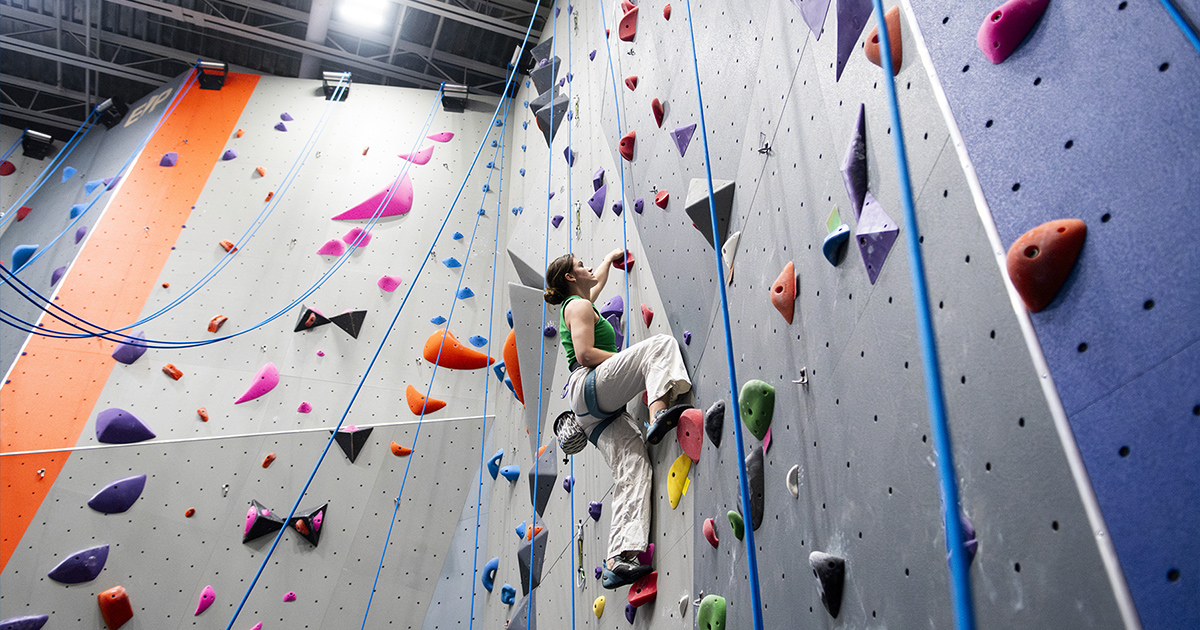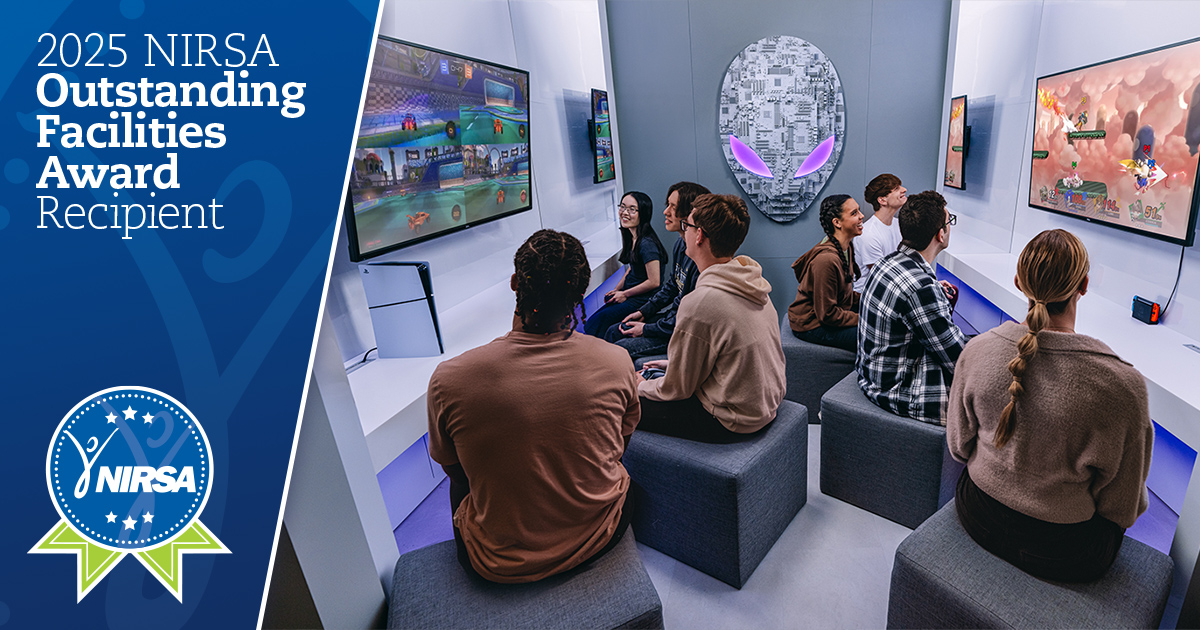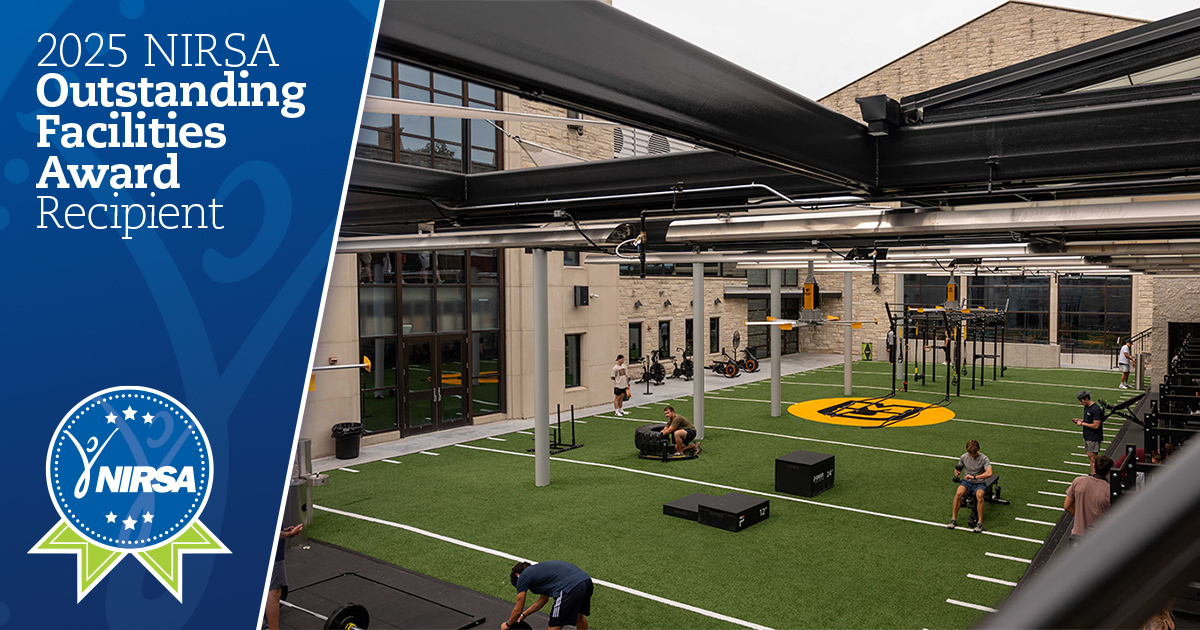RJ Canning worked as a camp counselor during his summers off from high school, and it was actually one of his supervisors there who set him off on a path in collegiate recreation. That supervisor encouraged RJ, a soon-to-be college freshman, to work at Rowan University’s REC Center in the intramurals department. RJ, who needed to find a work study job, ended up deciding that intramurals would be a good fit for him. “When I learned more about the position, I didn’t need a lot of convincing,” he recalls. So he started worked at the REC Center as a first-semester freshman. In fact, he has clear memories of heading to an all-staff training right after moving his stuff into his dorm room. And he’s been looking forward ever since.
RJ’s most recent professional position was as the Assistant Director of Competitive Sport at Towson University where he was onsite for the past three years. Following his graduation from Rowan University—where he was given the opportunity to “attend regional tournaments, and regional and national conferences”—he completed a graduate assistantship in intramural sports at the University of Texas at Austin. He was fortunate enough at UT Austin to be presented with even more opportunities to develop and grow. He actually credits that graduate assistantship with helping him decide that he really wanted to devote himself to a career in campus recreation. RJ left UT Austin for his very first professional position at the University of Virginia where he acted as the Assistant Director of Intramural and Club Sports. After two years with UVA, he accepted his previous position at Towson University.
RJ first became familiar with NIRSA while an undergraduate at Rowan University. “I was lucky enough to be part of a great NIRSA and campus recreation culture at Rowan,” he explains. “The professional staff I worked with gave me and so many other students the opportunities to develop and mature.” This included the chance to take on additional responsibilities. “The more I learned about NIRSA and the campus recreation field,” says RJ, “the more it grew on me.”
This eventually culminated in his continued involvement with both the Association and the profession. RJ believes that “recreation naturally has a way of bringing people together. Starting at a young age sports are a way to reach people and teach them valuable lessons.” He goes to on to say that “campus recreation uses a similar platform to develop our student employees and leaders, exposing them to critical thinking, problem solving, time management, conflict resolution, and a variety of other skills that can complement the knowledge they are taking away from their academic experience.” RJ concludes by saying, “Campus recreation truly provides the opportunity to create holistic students.”
He believes that “campus recreation is a great way to provide educational and professional development opportunities to college students in one of the most fun avenues possible.” This is because campus rec provides students with a multitude of choices on campuses. While just about everyone knows that campus recreation offers students ways to participate in healthy activities, the field is about so much more than just that. It offers students a way to “develop traits and characteristics that will assist them for the rest of their lives,” explains RJ.
He has really enjoyed being a professional who can help make “a large impact on the lives of students.” This is because sports have played an important role in his own life throughout the years. “Sports have influenced the development of my character and many skills I use every day in my career,” says RJ. “I’ve loved having the opportunity to use sports as a way for students to participate in recreation while developing important life skills.”
NIRSA has also provided tremendous opportunities for him to grow from a student into a successful professional. “The Association has provided me with the chance to continue to learn, share, and network with my colleagues across the country,” says RJ. The scholarship he received from the NIRSA Foundation in 2010 while a graduate assistant at UT Austin really helped him continue his networking across the field. He used the scholarship to attend the 2010 Annual Conference in Anaheim, California. He recalls that this conference was “a great way for me—as a first-year GA—to connect with other GAs within intramurals, and for us to share our experiences and opportunities to collaborate and present in the future.” The scholarship, he says, gave him the chance to “meet and network with professionals I would not have had the opportunity to otherwise.” This NIRSA Foundation scholarship meant a lot to RJ because, he explains, “It was confirmation that my role as a graduate assistant and that the work I was doing was valuable. Specifically, as a student, it was nice to have a committee invest in my continued professional development.”
The Association and its membership are committed to supporting burgeoning rec professionals. This plays a large part in why NIRSA Foundation scholarships exist as well as why mentorship is so integral to the profession. When asked what advice he has for current students and future rec professionals, RJ says, “My biggest advice would be to find a great mentor and to network and meet as many people as possible.” For RJ, networking is fundamental in professional development. “Exchanging ideas and problem solving with colleagues within the field has allowed me to try new things and make fast efficient changes to benefit the programs I manage,” he says.
When asked about his own mentors, RJ mentions one name specifically: Kevin George, Assistant Director of Intramurals and Facilities at Rowan University. “He was my first campus rec supervisor and I’m proud to say still a great friend and mentor,” says RJ. “During my time at Rowan, Kevin continued to provide me with new development opportunities. He challenged me to be better and think bigger. Kevin and I still speak often and I still seek out his advice and perspective on both personal and professional matters.”
At Towson, RJ served as a mentor to many different employees. “I recently oversaw many different types of staff members including professional staff, graduate assistants, interns, and student employees,” he says. “All employees have different strengths and weaknesses and are at different places in their careers,” he explains. “Understanding what they need to be successful is a huge part of mentorship.” He goes on to say, “Mentorship for me is about providing opportunities for growth and development and the appropriate resources to each different employee.”
The Association has given RJ so much—introducing him to a lifelong mentor and providing his with networking and development opportunities—and he’s committed to giving back. “The NIRSA Foundation strives to provide opportunities to students and professionals to continue their professional development,” says RJ. “I was fortunate enough to be recognized in the form of a scholarship and I believe it is important to pay that opportunity forward to other students and members.” On top of the scholarships, RJ knows that NIRSA has provided tremendous opportunities for him to grow from a student into a successful professional. It’s also provided him with the chance to continue to learn, share, and network with my colleagues across the country. “NIRSA has been a vital part of my success in the field,” says RJ. “It’s assisted me with providing excellent programming to the students I interact with on a regular basis.”
NIRSA remains as committed to its membership as its members are to it. The Association is proud to support student development and research advocating for the field. After receiving a NIRSA Foundation Scholarship, benefiting from years of mentorship from Association professionals, and seeing firsthand the positive impact that campus recreation can have on students, RJ knows there are real benefits to staying invested in NIRSA: Leaders in Collegiate Recreation.
RJ’s experience—as well as those of hundreds of other students and volunteers—is made possible by generous donors to the NIRSA Foundation. Learn more about how they are working to strengthen the future of collegiate recreation and how you can support their efforts.
- If you’re interested in sharing your story, please contact NIRSA Foundation Board Member Chris Muller, or NIRSA Foundation Coordinator Kelley Hungerford.
Nazifa Islam was previously the Communications Coordinator at NIRSA.








